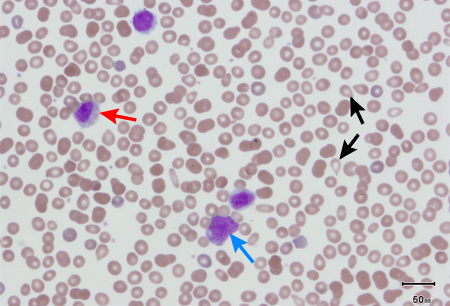Резюме
Определение
Анамнез и осмотр
Ключевые диагностические факторы
- presença de fatores de risco
- sintomas de anemia (fadiga, fraqueza, dispneia, palpitações)
- sintomas constitucionais (perda de peso, sudorese noturna, febre baixa, caquexia, fadiga e prurido)
- esplenomegalia ± hepatomegalia
- características da hematopoese extramedular
Другие диагностические факторы
- características de hipertensão portal
- dor nas articulações e nos ossos
- perda auditiva
- sangramento
- infecções
Факторы риска
- exposição à radiação
- exposição a solventes industriais
- idade ≥65 anos
- anormalidades citogenéticas
Диагностические исследования
Исследования, которые показаны в первую очередь
- Hemograma completo com diferencial
- esfregaço de sangue periférico
- aspiração da medula óssea
- biópsia da medula óssea
- hibridização in situ fluorescente (FISH) ou reação em cadeia da polimerase via transcriptase reversa multiplex
- análise de mutações genéticas
Исследования, проведение которых нужно рассмотреть
- análise citogenética da medula óssea
- ecocardiograma
- ultrassonografia do local suspeito
- cintigrafia com tecnécio-99
- tomografia computadorizada (TC) do local suspeito
- ressonância nuclear magnética (RNM) do local suspeito
- ácido úrico sérico
- fator antinuclear
- título do fator reumatoide
- níveis do complemento
- teste de Coombs
Алгоритм лечения
menor risco: assintomático
risco baixo: sintomático
risco mais elevado: candidato mais jovem a transplante de células-tronco sem comorbidades
risco mais elevado: candidato a transplante de células-tronco >70 anos ou candidato a transplante de células-tronco mais jovem com comorbidades
risco mais elevado: não é candidato a transplante de células-tronco
Составители
Авторы
Jerry L. Spivak, MD

Professor of Medicine and Oncology
Division of Hematology
Johns Hopkins University School of Medicine
Baltimore
MD
Disclosures
JLS is an author of several references cited in this topic and has been reimbursed by GSK for a consultation.
Acknowledgements
Professor Jerry Spivak would like to gratefully acknowledge Dr Ashkan Emadi, a previous contributor to this topic.
Disclosures
AE declares that he has no competing interests.
Peer reviewers
John T. Reilly, BSc, MD, FRCP, FRCPATH
Professor and Consultant in Haematology
Royal Hallamshire Hospital
Sheffield
UK
Disclosures
JTR is an author of several references cited in this topic.
Giovanni Barosi, MD
Director of the Laboratory of Clinical Epidemiology
IRCCS Policlinico S. Matteo Foundation
Pavia
Italy
Disclosures
GB declares that he has no competing interests.
Richard Silver, MD
Myeloproliferative Disorders Program Specialist
Department of Medicine
Division of Hematology and Medical Oncology
Weill Cornell Medical College
New York
NY
Disclosures
RS is an author of a reference cited in this topic.
Peer reviewer acknowledgements
BMJ Best Practice topics are updated on a rolling basis in line with developments in evidence and guidance. The peer reviewers listed here have reviewed the content at least once during the history of the topic.
Disclosures
Peer reviewer affiliations and disclosures pertain to the time of the review.
References
Key articles
Tefferi A. Primary myelofibrosis: 2023 update on diagnosis, risk-stratification, and management. Am J Hematol. 2023 May;98(5):801-21.Full text Abstract
National Comprehensive Cancer Network. NCCN clinical practice guidelines in oncology: myeloproliferative neoplasms [internet publication].Full text
McLornan DP, Godfrey AL, Green A, et al. Diagnosis and evaluation of prognosis of myelofibrosis: a British Society for Haematology Guideline. Br J Haematol. 2024 Jan;204(1):127-35.Full text Abstract
Kröger N, Bacigalupo A, Barbui T, et al. Indication and management of allogeneic haematopoietic stem-cell transplantation in myelofibrosis: updated recommendations by the EBMT/ELN International Working Group. Lancet Haematol. 2024 Jan;11(1):e62-74. Abstract
McLornan DP, Psaila B, Ewing J, et al. The management of myelofibrosis: a British Society for Haematology Guideline. Br J Haematol. 2024 Jan;204(1):136-50.Full text Abstract
Reference articles
A full list of sources referenced in this topic is available to users with access to all of BMJ Best Practice.

Differentials
- Policitemia vera
- Trombocitemia essencial
- Leucemia mieloide crônica
More DifferentialsGuidelines
- NCCN clinical practice guidelines in oncology: myeloproliferative neoplasms
- NCCN clinical practice guidelines in oncology: hematopoietic cell transplantation (HCT)
More GuidelinesCalculators
Dynamic International Prognostic Scoring System-plus (DIPSS-plus)
Mutation and Karyotype-Enhanced International Prognostic Scoring System for Primary Myelofibrosis in adults 70 and younger (MIPSS70+ versão 2.0)
More CalculatorsLog in or subscribe to access all of BMJ Best Practice
Use of this content is subject to our disclaimer